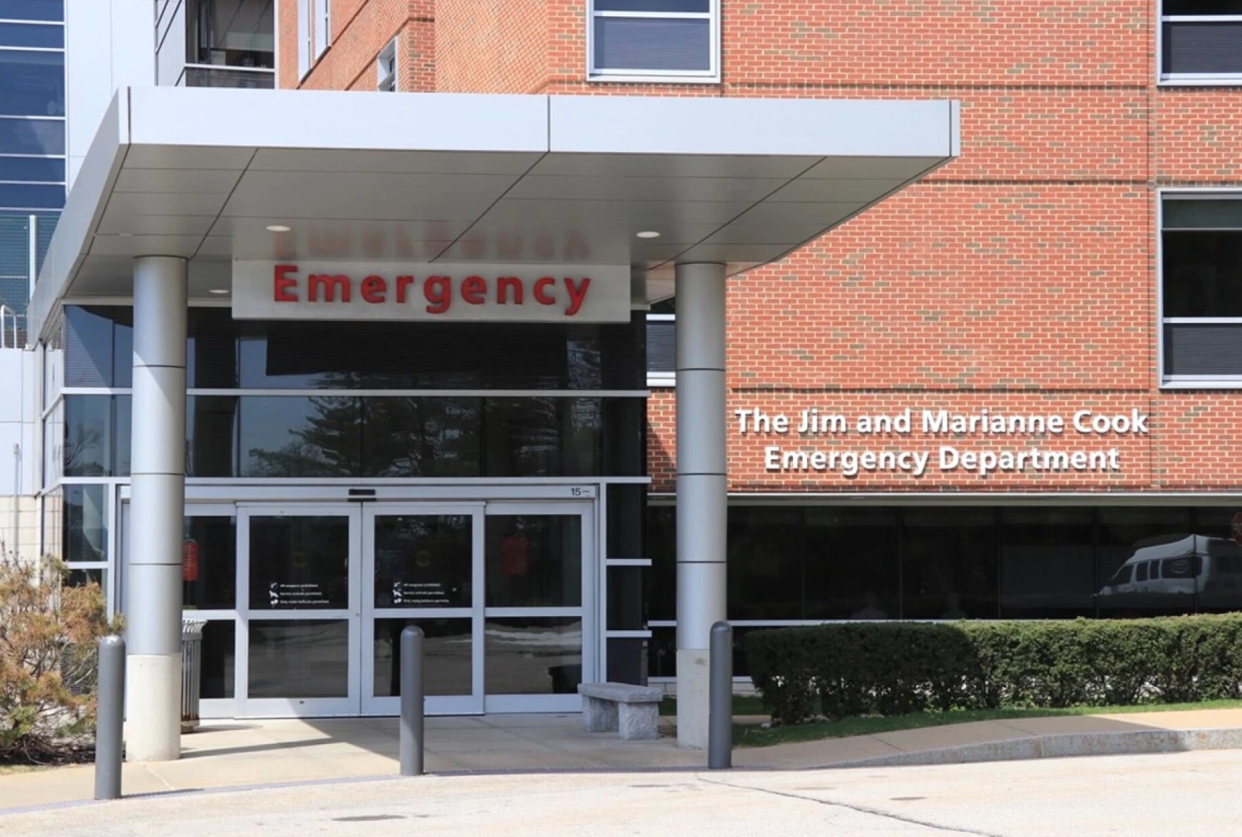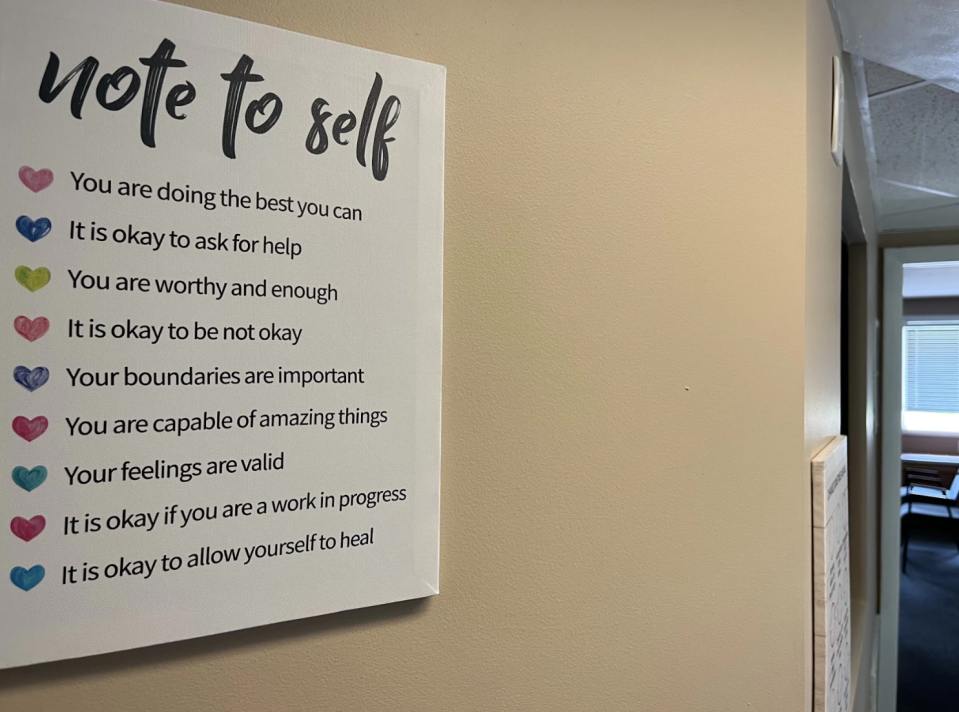NH missed a court deadline to end ER boarding. But it's making some progress.

- Oops!Something went wrong.Please try again later.
For the last year, New Hampshire has been staring down a deadline for ending a persistent problem: patients languishing in emergency rooms for days or weeks, due to a lack of inpatient mental health care.
Last May, a federal judge ruled that had to end and gave the state 12 months to fix it.
That deadline was May 17. But state officials say they need more time — because the backlog of patients in hospital emergency rooms is just one symptom of larger challenges facing New Hampshire’s mental health system.
As state leaders work to repair the gaps in that system, they’re trying everything from opening more inpatient beds to expanding services that keep people out of the ER in the first place.
“We are hitting the gas more than we really ever have, on any issue, when it comes to this effort,” Morissa Henn, the deputy commissioner of New Hampshire’s Department of Health and Human Services, told NHPR in an interview last week.
Despite signs of progress, these efforts to repair New Hampshire’s broken mental health system have been complicated by the surge in demand during the COVID-19 pandemic and ongoing workforce shortages. And that’s left a lot of people who are struggling to get the care they need.
What is ER boarding?
Around 2013, after steep cuts to state funding for community mental health services and a wave of psychiatric unit closures, mental health advocates began sounding the alarm. Patients in distress were being admitted to hospitals through a process known as involuntary emergency admission, and then held in emergency rooms for days or weeks, waiting for treatment.
The problem continues to this day. On Wednesday, May 15 – the most recent available data – seven adults were in that same position, along with six children admitted voluntarily for acute psychiatric care. Those who’ve been through the process say it can be dehumanizing: your personal effects are taken away, you’re confined to a room in a busy emergency department and not getting any real mental health treatment.
One woman – who asked to go only by her initials, H.M. – said she wound up in the Elliot Hospital emergency department last year after unintentionally overdosing on pills. After medical staff decided to hold her under an involuntary emergency admission, she said an armed guard escorted her to a concrete “holding area.”
“They basically strip searched me and put me in a room that was more like a room you'd see in a prison,” she said. “The chairs were bolted to the floor. The bed was bolted to the floor.”
H.M. said she spent only a few hours there before being transferred to the hospital’s mental health unit. But she talked to other patients who were there for a week.
“To be treated like that, just because you have a mental health issue, to me felt extremely inhumane,” she said.

After a lawsuit, a judge intervenes
H.M. is a plaintiff in a class-action lawsuit brought by the ACLU of New Hampshire in 2018, alleging violations of patients’ due process rights. A group of hospitals later got involved, arguing ER boarding was straining their resources and the state was shirking its responsibility to care for those patients.
In response to their petitions, U.S. District Court Judge Landya B. McCafferty said the state could only keep adults admitted involuntarily in emergency rooms for up to six hours. They had to find a way to move those patients into mental health treatment within that window. She gave the state 12 months to comply.
From the start, state officials said it would take closer to two years to make that happen. But they ultimately agreed to forego an appeal and work toward the one-year deadline.
On Tuesday, May 14 the state notified the court it would not be able to comply, despite “significant progress” in reducing the waitlist for inpatient mental health care.
This time last year, the number of adults being held in emergency rooms was hovering in the 40s. In recent weeks, it’s typically been less than half that and sometimes dropped into the single digits. In its court filing, the state said it expects “to effectively eliminate the current waitlist by the end of this calendar year.”
McCafferty subsequently said she would consider extending the deadline through December, and has given the hospitals until Wednesday to object.
The New Hampshire Hospital Association did not respond to requests for comment.
Gilles Bissonnette, the ACLU-NH’s legal director, said there have been positive steps – but people in need of mental health care are still being detained in ERs.
“We have been litigating this for five and a half years, and there have been steps taken throughout those five and a half years to try to mitigate the waitlist – and we are still here, with a waitlist, as of May 2024,” he said.
“So, you know, I'm always hopeful that these promises will be kept, and we're going to be continuing to monitor that.”

‘Mission Zero’
After the court order came down last spring, Gov. Chris Sununu and other state officials rolled out their plan to eliminate ER boarding within two years, called “Mission Zero.”
The plan has three broad parts: adding more inpatient psychiatric beds, strengthening mental health services that can reduce the need for hospitalization and helping more people “step down” from inpatient care into supportive housing or other community-based settings.
“What we're doing along the way is really transforming the public mental health system in New Hampshire to better serve people,” Henn said.
Some of that has started to roll out. Earlier this spring, the state reopened 12 beds at New Hampshire Hospital – the state’s main psychiatric facility for adults – that had been closed for over a year due to renovations and staffing issues.
Another 17 beds remained offline as of Wednesday and are slated to reopen later this year. State officials initially said they expected to have the hospital back at full capacity by December 2023, but Henn said that’s been slowed by construction and other issues.
But it’s not just about bringing more beds online at the state hospital — the state has also struggled, at times, to discharge patients who are ready to leave but have no safe place to go. The state says it has made progress clearing this backlog on several fronts: moving some patients into nursing home care, opening the first of four supportive “step-down” residences and incentivizing landlords to rent to patients ready to move into apartments.
The state has also hired a team of coordinators to match patients in hospital ERs with available beds more quickly – centralizing what Henn said had been a fragmented, inefficient process.
More plans are in the pipeline for the coming months and years. That includes expanding services at certain community mental health centers and opening several new crisis stabilization centers – where people can stay for up to 24 hours as an alternative to hospitalization.
Five new inpatient psychiatric beds should come online at Dartmouth-Hitchcock Medical Center this fall. And a new mental health hospital in Londonderry is scheduled to open in 2026, operated by SolutionHealth. The state is pitching in $15 million in federal pandemic relief money to help fund construction.
Susan Stearns, who leads the mental health advocacy group NAMI-NH, is on the steering committee for the state’s Mission Zero plan. She says these and other efforts to build out the state’s mental health services are, slowly but surely, making a difference.
“Sometimes it's hard because you're in the midst of it to really see it,” she said. “But I believe we are in the midst of systems transformation – which is a hard thing to do.”
Sizing up Sununu’s promises
The ER boarding case is not the first time a court’s had to get involved to force changes to New Hampshire’s mental health system. The state is still working to comply with a 2014 settlement – which came down when Maggie Hassan was governor – over inadequate community-based mental health services.
When Sununu took office in 2017, he pledged to fix the state’s mental health system, telling lawmakers that dealing with the treatment shortage was “not a option but a mandate.”
“To be blunt about it, these problems could have and should have been addressed long ago,” Sununu said at the time. “And I can’t speak for previous administrations but I can tell you in my first 100 days here it has come to stark light to me just how in disarray our mental health system truly is.”
Under Sununu’s administration, the state has taken steps to shore up that system – and respond to a surge in mental health issues during the COVID-19 pandemic that was especially acute among children. In February 2021, the number of children waiting for mental health care in ERs hit an all-time high of 51.
Some of those changes came after the New Hampshire Supreme Court ruled against the state in a separate lawsuit over ER boarding in 2021, saying the state could not indefinitely detain patients in ERs without a probable cause hearing. In the wake of that, Sununu issued an executive order directing state health officials to take immediate steps to increase mental health access.
The state has also made longer-term investments to expand the mental health system’s capacity, boosted by an influx of federal funds during the pandemic. In recent years, the state has expanded peer support services, bought Hampstead Hospital to provide inpatient psychiatric care for minors and rolled out statewide mobile crisis teams.
Roland Lamy, who heads a group representing New Hampshire’s 10 community mental health centers, said those new mobile crisis teams have helped many people get help when they needed it.
“We absolutely know that there are a number of cases that, had they not been treated by our rapid response program, would have ended up in the ED,” he said.
As the ER boarding problem has persisted, the governor has also sparred publicly with hospitals, saying they’re not doing enough to help and criticizing them for going to court – even as his top health officials have pledged collaboration. The hospitals have pushed back on Sununu’s characterization.
Last year, Sununu proposed requiring every hospital to operate mental health beds capable of accepting involuntary admissions as a condition of their license – and changing New Hampshire law to remove the state’s duty to “immediately” transfer IEA patients into mental health treatment. Neither proposal went anywhere.
“Hospitals have in this state have completely separated themselves from the mental health issue,” Sununu said at an event last week. “I think it's quasi-criminal. It drives me crazy.”
But as his administration continues to chip away at the problem, fundamental challenges remain – including a workforce shortage that was exacerbated by the pandemic. As of March, mental health centers had more than 300 vacant clinical positions, and some people are waiting months for appointments.
“That is the number one reason people call our information resource line: I cannot find someone to care for me or my loved one,” Stearns said.

If you or someone you know might be thinking about suicide, contact the National Suicide and Crisis Lifeline by calling or texting 988. You can also get mental health support by calling or texting New Hampshire's Rapid Response Access Point at 833-710-6477.
These articles are being shared by partners in The Granite State News Collaborative. For more information visit collaborativenh.org.
This article originally appeared on Portsmouth Herald: NH missed a court deadline to end ER boarding. But it's making some progress.

